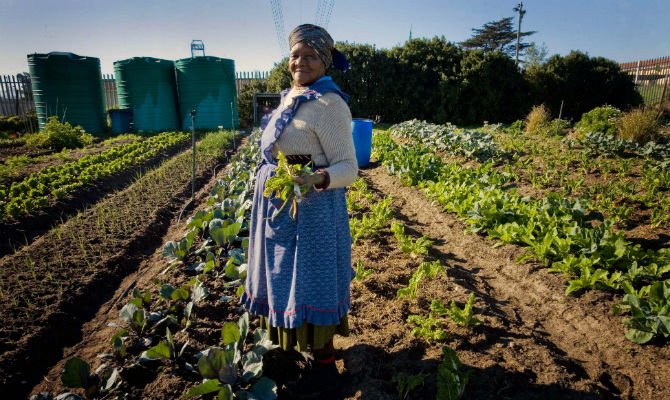I say it all the time without thinking when someone asks, “Are you hungry?”
“I’m starving.”
And it’s not just me. Listen the next time you’re at a restaurant, as people sit down or start to look at the menu, “OMG I’m famished…” “I could eat everything…” “I’m literally starved…”
I know, I know, we’ve heard it all before. No we’re not actually starving or famished, and there are way too many people in the world who actually suffer from hunger (1 in 9). But still, it got me thinking...what is the correct way to talk about world hunger?
Global Citizen has worked hard to raise awareness about, and end, global hunger. At the Global Citizen Festival, Senator Ted Coons told us about the proposed Food for Peace Reform Act so the US can be more efficient in how we send food aid, which would help with the success of Global Goal 2: Zero hunger.
But it’s hard to tackle a cause as big and important as world hunger when perople aren’t always speaking about it accurately. It’s not just what people talk about that matters, but also how they talk about it, and the topic of global hunger involves a lot of specific terminology: malnourished, undernourished, stunted, food security... Even a word as seemingly simple as “hunger,” is a lot more nuanced and complicated when you break it down.
So it’s time for a collective Global Citizen vocabulary lesson. Get ready to make some flashcards.
Words to know when talking about hunger (in alphabetical order, naturally):
Famine: An extreme scarcity or shortage of food. According to the UN a region is famine-stricken when over 20% of households don’t get the recommended caloric intake, over 30% of people are in a state of chronic malnutrition, and there are two famine-related deaths per 10,000 people daily.
Food Security: Reliable access to a sufficient quantity of affordable, nutritious food. Basically, having food security means that people have both physical and economic access to all the food they need to stay healthy. Food insecurity, is often understood as when people don’t know where their next meal will come from, and it is rooted in poverty.

Hunger: A severe lack of food. “Hunger” can mean different things for different people, but in general it’s a feeling of discomfort, pain or weakness caused by lack of food. For some people hunger is just the uneasy feeling in your stomach when you haven’t eaten in a while, but for those who suffer from chronic hunger this uneasy feeling becomes something so crippling it can result in total exhaustion, lack of concentration, and inability to perform the simplest tasks. It’s the kind of hunger that results in malnourishment, wasting and stunting (see definitions below). Keep in mind that sometimes just having enough food to eat doesn’t address hunger. It’s also about having the right food to eat to prevent malnutrition.
Malnutrition: In the simplest terms, malnutrition is “bad” nutrition. Technically malnutrition includes both a lack of nutrients, aka “undernutrition,” or an excess of nutrients, aka “overnutrition.”
Overnutrition: When a body has an excess of nutrients. Overnutrition is caused by generally eating too much, specifically eating too much of the wrong kind of food, not exercising enough, or taking too many dietary supplements. Overnutrition is also known as hyperalimentation and can refer to obesity.
Stunting: When a child is prevented from growing/developing properly due to chronic malnutrition (that is, if a child does not consume the right amount of nutrients over a sustained period of time). Stunting can start before a baby is born if their mother is undernourished, or immediately after birth when a baby is breastfeeding. Stunting does not just affect a child’s physical growth, but, if severe enough, can impact their brain function, making schooling and work more difficult later in life. The effects of stunting are largely permanent if malnourishment isn’t addressed before a child is five-years old.
Undernutrition: When a person does not get enough nutrients because they are not eating enough, because the food they are eating is not sufficiently nutrient-rich, or because they are excreting nutrients more quickly than they can be replaced. When a person is undernourished their body does not get the nutrients needed to stay healthy, fully develop, or resist diseases. Undernourishment can also happen if illness prevents a person from using the nutrients from the food they do eat.
Underweight: Having a low weight-for-age measurement. The World Health Organization has child growth standards that take into account the median weight for a given population depending on age, and if a person is too far below this standard they are considered underweight.
Wasting (aka acute malnutrition): When a person experiences rapid weight loss or an inability to gain weight, they are said to be wasting. There are severe or moderate degrees of wasting. According to the UN’s World Food Program, since wasting is caused by illness or a sudden and severe lack of food (and is strongly linked to mortality), levels of wasting are used to asses the severity of an emergency.
Now that we have the tools to accurately discuss world hunger, it’s time to spread the conversation!
Go to TAKE ACTION NOW to tweet to end hunger and malnutrition by 2030!